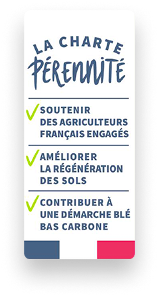
La charte Pérennité
to cultivating more sustainable French wheat.

Through a new identity, the Pérènes® brand becomes the first bread brand in French supermarkets to actively support the low-carbon French wheat sector.

The Pérennité Charter represents the brand’s commitment to this low- carbon approach.
It is based on three fundamental pillars:
✓ Supporting committed French farmers
✓ Improving soil regeneration
✓ Contributing to a low-carbon wheat initiative

We make over 30,000 choices daily, and one way or another, the world changes with every choice we make.
Because it’s all connected.
Pérènes® aims to highlight the people who work to improve every part of a chain linked by what is better and what is good. We strive to work with French farmers committed to growing wheat through a more sustainable and responsible low-carbon agriculture. In this context, the Pérènes® brand amplifies the voice of this new form of agriculture and is committed to promoting it to as many people as possible, to showcase the work carried out by farmers belonging to the Axéréal cooperative who are engaged in these new agricultural practices. We work on authentic recipes for our breads, made from French wheat. So they are both flavorful and wholesome.
Pérènes, united by goodness.

Supporting committed
French farmers
In 2024, Pérènes® partnered with the agricultural cooperative Axéréal, which brings together 11,000 committed farmers around a common vision:
- Sustaining agricultural crops such as wheat
- Contributing to a high-quality food supply.
This partnership gave rise to the desire to cultivate and produce more sustainably and responsibly, focusing on low-carbon wheat.
Among these producers, a group of nearly 250 farmers committed in 2023 to an initiative aimed at developing more sustainable agriculture with reduced greenhouse gas emissions in the coming years. At the heart of this low-carbon ambition lies the principle of regenerative agriculture, embodied at Axéréal by the CultivUp Regenerative framework. This framework is based on regular external audits and serves as a foundation for creating sustainable supply chains.
Built on 74 criteria with mandatory outcomes:
- Based on specifications derived from the Cool Farm Tool.
- Referenced by the Ministry of Agriculture and Food Sovereignty, and at the European level.
- Compliant with the SBTI (Science Based Targets Initiative) project, engaged in combating the climate crisis.
- SAI (Sustainable Agriculture Initiative) is a global initiative bringing together nearly 200 companies and organizations leading the way in sustainable agriculture.

Improving soil regeneration

What is regenerative agriculture?
One of the major upcoming challenges is reconciling sufficient production of French raw materials with environmental preservation. Soil regeneration and the protection of living organisms have thus become priorities, as better soil fertility is the key factor in ensuring compatibility between production and environmental respect.

Regenerative agriculture lies at the heart of this low-carbon ambition.
This practice encompasses a range of techniques designed to naturally improve soil quality and strengthen ecosystems. It promotes water retention, enhances biodiversity, and improves soil regeneration, which in turn increases the Earth’s capacity to capture carbon, thereby reducing greenhouse gas emissions.
Regenerative agriculture and low-carbon agriculture are therefore closely linked.


- By improving soil fertility through selective, reasoned ploughing to a maximum depth of 15cm.
- By returning nitrogen to the soil, either through crops that naturally return nitrogen to the soil (creation of a plant cover system), or through the use of organic fertilizers.

- By prioritizing bio-solutions, such as bio-fertilizers that enable crops to better absorb nutrients, preserving soil resources through the rhizosphere.
- By favoring biostimulants that stimulate plant defenses and enhance their potential.
- By encouraging biocontrol, a family of natural products such as macro organisms, micro-organisms, and pheromones, which imitate nature to protect plants against biotic stresses.
- By developing the use of new technologies and decision-support tools, which indicate the doses of fertilizers and phytosanitary products to be applied.

- Extend rotations by introducing intermediate crops (ideally legumes) that are both “low-input” and fertilizing, thus limiting the consumption of chemical fertilizers.
- By developing soil cover and the use of service plants, which, when combined with a crop, improve soil fertility.

- Improve water management through better control of irrigation.

- Strengthen farm profitability and enhance the value of farmers’ work and new farming practices.
- Encourage diversification of their activities.

Contributing to a low-carbon
wheat approach

Pérènes® provides financial support to Axéréal’s low-carbon wheat iniative. In this context, the brand contributes to the development of these innovative agricultural practices.

Pérènes® also aims to elevate the profile of low-carbon agriculture and promote it to a wider audience, in order to highlight the work of farmers committed to the Axéréal cooperative’s CultivUp Régénératif standard.

Finally, Pérènes® aims to make these advances in more responsible agriculture accessible to the final consumer and contribute to tangible progress in sustainable development.
A leading-edge player in low-carbon wheat, Pérènes® uses mass balance sourcing approach, similar to other fair-trade, organic, and recycled products.
Low-carbon wheat aims to reduce the carbon footprint of its production by optimizing agricultural practices and relying on specific environmental criteria. As its physical traceability (segregation) remains complex, it is not a physical “attribute” of the final Pérènes® bread. Once the low-carbon French wheat has been harvested by Axéréal, it can be mixed with conventional French wheat. Pérènes® breads are thus made from this combination of wheats.
This method allows for a concentrated financial focus on the farming practices themselves. The credibility and accuracy of the Pérènes® mass balance are ensured by external audits and a traceability system that certifies the low-carbon wheat sourced is indeed from Axéréal farms and the cooperative.
My commitment to low-carbon agriculture extends from the sustainable farming practices I have long championed on my farm.
Decarbonizing the agricultural and food sectors is a collective effort, and I’m proud that my wheat enables me to offer bakery products with a reduced carbon impact to consumers.
Changing my farming practices is a day-to-day, long-term task, for which the commitment of the various players in the sector is essential.

Pérènes®, committed to more sustainable agriculture.
The Pérennité charter, for long-term agricultural transformation.
Some key figures
This is the number of farmers committed to Axéréal CultivUp Régénératif’s low-carbon agriculture program by 2024.
The number of farmers who will be involved in the Axereal CultivUp Regenerative program by 2026.
The reduction in greenhouse gas emissions measured between 2023 and 2022 for low-carbon wheat compared with standard wheat.
The success of the first low-carbon wheat harvest in 2023 was notable, with wheat from regenerative agriculture producing a carbon footprint (including carbon absorptions) 81% lower than Agribalyse®’s conventional reference wheat.
Based on an analysis of the life cycle of a baguette of bread, it was measured that 85% of greenhouse gas emissions come from wheat farming. This figure demonstrates the importance of low-carbon agriculture for wheat.
The Pérènes® approach is part of France’s roadmap for reducing greenhouse gas emissions.
France’s roadmap for sustainable development and carbon emissions reduction is embodied in the SNBC: Stratégie Nationale Bas Carbone.
It defines a trajectory for reducing greenhouse gas emissions up to 2050 and sets shortto medium-term targets.
Introduced by the law of August 17, 2015, the SNBC aims to reduce emissions from the agricultural sector by 18% between 2015 and 2030, and by -46% between 2015 and 2050.

Agriculture is the second largest source of greenhouse gas emissions, accounting for 19% of the national total, with 85 million tons of CO2 equivalent emitted in 2019.

Working on improving wheat farming practices for a more sustainable and environmentally friendly agriculture is a major issue for the coming years.

To reduce the carbon footprint of raw material crops, regenerative agriculture is considered a crucial solution.
Sources
Pérènes® is a French brand established in the 1990s in the heart of Ariège, at the foot of the Pyrenees, and was historically known as Les Pains Pérènes de Roland Cottes.
Our range of breads is made in France from French wheat, which is why the issues surrounding wheat farming are at the heart of our concerns.
CultivUp Régénératif stands for contributing to more sustainable agriculture and ensuring low-carbon wheat becomes a benchmark for the future.